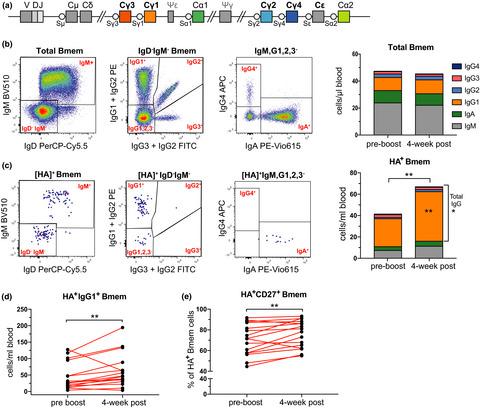当前位置:
X-MOL 学术
›
Clin. Transl. Immunol.
›
论文详情
Our official English website, www.x-mol.net, welcomes your feedback! (Note: you will need to create a separate account there.)
Influenza‐specific IgG1+ memory B‐cell numbers increase upon booster vaccination in healthy adults but not in patients with predominantly antibody deficiency
Clinical & Translational Immunology ( IF 5.8 ) Pub Date : 2020-10-16 , DOI: 10.1002/cti2.1199 Gemma E Hartley 1, 2 , Emily S J Edwards 1, 2 , Julian J Bosco 2, 3 , Samar Ojaimi 2, 4, 5, 6 , Robert G Stirling 2, 3 , Paul U Cameron 2, 3 , Katie Flanagan 1, 7, 8 , Magdalena Plebanski 8 , Philip Mark Hogarth 1, 9 , Robyn E O'Hehir 1, 2, 3 , Menno C van Zelm 1, 2, 3
Clinical & Translational Immunology ( IF 5.8 ) Pub Date : 2020-10-16 , DOI: 10.1002/cti2.1199 Gemma E Hartley 1, 2 , Emily S J Edwards 1, 2 , Julian J Bosco 2, 3 , Samar Ojaimi 2, 4, 5, 6 , Robert G Stirling 2, 3 , Paul U Cameron 2, 3 , Katie Flanagan 1, 7, 8 , Magdalena Plebanski 8 , Philip Mark Hogarth 1, 9 , Robyn E O'Hehir 1, 2, 3 , Menno C van Zelm 1, 2, 3
Affiliation

|
Annual influenza vaccination is recommended to all individuals over 6 months of age, including predominantly antibody deficiency (PAD) patients. Vaccination responses are typically evaluated by serology, and because PAD patients are by definition impaired in generating IgG and receive immunoglobulin replacement therapy (IgRT), it remains unclear whether they can mount an antigen‐specific response.
中文翻译:

流感特异性 IgG1+ 记忆 B 细胞数量在健康成人加强疫苗接种后增加,但在主要抗体缺乏的患者中不增加
建议所有 6 个月以上的人每年接种流感疫苗,包括主要是抗体缺乏 (PAD) 的患者。疫苗接种反应通常通过血清学评估,并且由于 PAD 患者在产生 IgG 和接受免疫球蛋白替代疗法 (IgRT) 方面的定义受损,因此尚不清楚他们是否可以产生抗原特异性反应。
更新日期:2020-10-17
中文翻译:

流感特异性 IgG1+ 记忆 B 细胞数量在健康成人加强疫苗接种后增加,但在主要抗体缺乏的患者中不增加
建议所有 6 个月以上的人每年接种流感疫苗,包括主要是抗体缺乏 (PAD) 的患者。疫苗接种反应通常通过血清学评估,并且由于 PAD 患者在产生 IgG 和接受免疫球蛋白替代疗法 (IgRT) 方面的定义受损,因此尚不清楚他们是否可以产生抗原特异性反应。


























 京公网安备 11010802027423号
京公网安备 11010802027423号